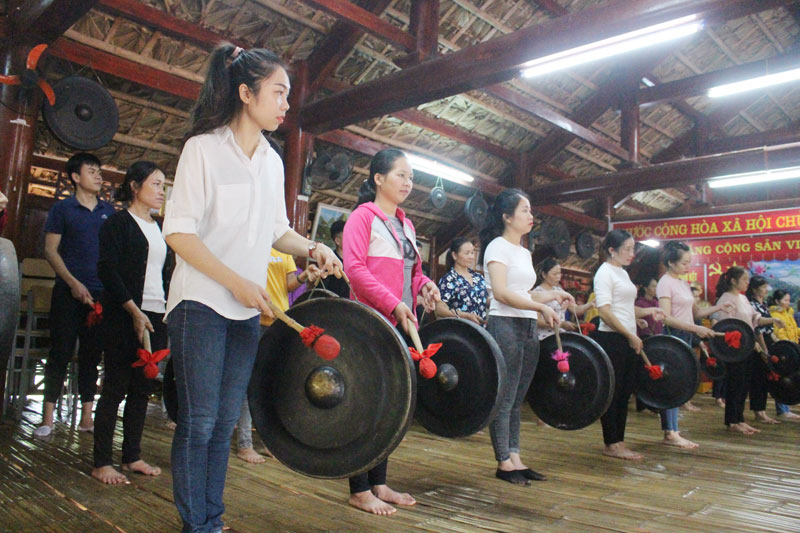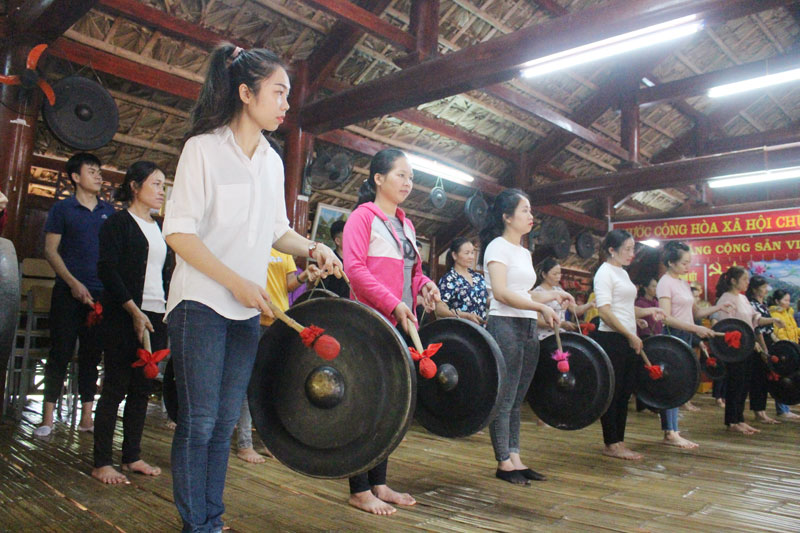
(HBO) - In 2019, Tan Lac district is considered to be a successful year in the field of cultural and artistic activities. The district has achieved high results in competitions and performances in Hoa Binh province and the region.
 The performance of Phong Phu Commune (Tan Lac)
performed the national cultural repertoire.
The performance of Phong Phu Commune (Tan Lac)
performed the national cultural repertoire.
In 2019, the district successfully organized a
Mass Art Festival with the participation of more than 500 actors and artisans
from communes and towns; participated in Hoa Binh province's Public Art
Performance, won the A Prize for the whole delegation.
Especially, 2019 is the year which many cultural and
artistic activities in the province and district are highly appreciated with
outstanding marks. In particular, the district is the place chosen to organize
activities of displaying and performing typical cultural heritages of ethnic
groups of Hoa
Binh province in the Provincial Cultural and Tourism Week. The district was
selected to participate in the contest of propaganda on sovereignty and
sustainable development of the sea and islands of Vietnam in the Northern
mountainous area...
Currently, 100% hamlet in Tan Lac district has art club. A lot of villages have from 2 to 3 performance teams. In many communes,
associations and unions established clubs to preserve folklore.
Public culture has been increasingly affirmed,
becoming an indispensable spiritual part of people in Tan Lac district. Every year, in addition to the
festivals, contests organized by the district, during the festivals, New Year,
and anniversaries, at many localities, there are a
lot of cultural, sporting and collecting activities which attract people to cheer, contributing to improving the spiritual
life, meeting the needs of cultural and artistic enjoyment of the population
community.
With an increasingly vibrant and widespread emulation movement aimed at building cultured residential areas and cultured families, Yen Thuy District has been making steady progress toward improving both the material and spiritual well-being of its people, while fostering a civilized, prosperous, beautiful, and progressive community.
Once lacking recreational spaces and community facilities, Residential Group 2 in Quynh Lam Ward (Hoa Binh City) has recently received attention for the construction of a new, spacious, and fully equipped cultural house. The project followed the model of state support combined with public contributions in both labor and funding.
The "All people unite to build cultural life" movement, which has been effectively integrated with Kim Boi district’s socio-economic development goals, is fostering a lively spirit of emulation across local residential areas, hamlets, villages, public agencies, and enterprises. In addition, through the initiative, traditional cultural values are being preserved and promoted, while community solidarity and mutual support in poverty reduction and economic development are being strengthened.
A working delegation of the Hoa Binh provincial People’s Committee led by its Permanent Vice Chairman Nguyen Van Toan on June 11 inspected the progress of a project to build the Mo Muong Cultural Heritage Conservation Space linked to tourism services in Hop Phong commune, Cao Phong district.
Born and growing in the heroic land of Muong Dong, Dinh Thi Kieu Dung, a resident in Bo town of Kim Boi district, in her childhood was nurtured by the sweet lullabies of her grandmother and mother. These melodies deeply imprinted on her soul, becoming an inseparable part of her love for her ethnic group's culture. For over 20 years, this love for her hometown has driven Dung to research, collect, and pass down the cultural values of the Muong people to future generations.
In the final days of May, the Ethnic Art Troupe of Hoa Binh Province organized performances to serve the people in remote, mountainous, and particularly disadvantaged areas within the province. These were not just ordinary artistic shows, but they were the meaningful journeys aimed at spreading cultural values, enhancing the spiritual life of the people and contributing to the preservation of ethnic minority cultural identities.



 The performance of Phong Phu Commune (Tan Lac)
performed the national cultural repertoire.
The performance of Phong Phu Commune (Tan Lac)
performed the national cultural repertoire.